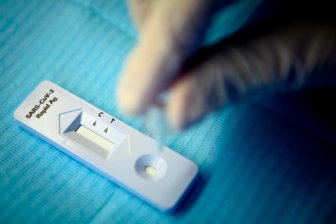
Historic 1st all-private astronaut team safely docks to space station
The first all-private team of astronauts sent to the International Space Station (ISS) arrived safely at the orbiting research platform on Saturday to begin a week-long science mission hailed as a milestone in commercial spaceflight.
The rendezvous came about 21 hours after the four-man team representing Houston-based startup company Axiom Space Inc lifted off on Friday from NASA’s Kennedy Space Center, riding atop a SpaceX-launched Falcon 9 rocket.
The Crew Dragon capsule lofted to orbit by the rocket docked with the ISS at about 8:30 a.m. EDT (1230 GMT) on Saturday as the two space vehicles were flying roughly 250 miles (420 km) above the central Atlantic Ocean, a live NASA webcast of the coupling showed.
The final approach was delayed by a technical glitch that disrupted a video feed used to monitor the capsule’s rendezvous with ISS. The snafu forced the Crew Dragon to pause and hold its position 20 meters away from the station for about 45 minutes while mission control trouble-shooted the issue.
With docking achieved, it was expected to take about two hours more for the sealed passageway between the space station and crew capsule to be pressurized and checked for leaks before hatches can be opened, allowing the newly arrived astronauts to come aboard ISS.
The multinational Axiom team, planning to spend eight days in orbit, was led by retired Spanish-born NASA astronaut Michael Lopez-Alegria, 63, the company’s vice president for business development.
His second-in-command was Larry Connor, a real estate and technology entrepreneur and aerobatics aviator from Ohio designated as the mission pilot. Connor is in his 70s but the company did not provide his precise age.
Rounding out the Ax-1 crew were investor-philanthropist and former Israeli fighter pilot Eytan Stibbe, 64, and Canadian businessman and philanthropist Mark Pathy, 52, both serving as mission specialists.
Stibbe became the second Israeli to fly to space, after Ilan Ramon, who perished with six NASA crewmates in the 2003 space shuttle Columbia disaster.
They will be joining the existing ISS occupants of seven regular, government-paid space station crew members – three American astronauts, a German astronaut from the European Space Agency and three Russian cosmonauts.
(Reporting by Steve Gorman in Los Angeles; Editing by Angus MacSwan and Daniel Wallis)
© 2022 Reuters



